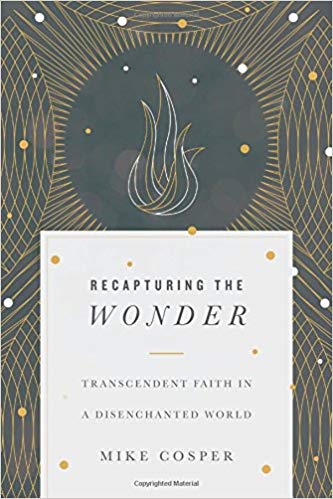In Recapturing the Wonder, Mike Cosper has written a unique book that explores spiritual disciplines in our secular context. Cosper says that his book is “an attempt to sketch out the spiritual landscape of an age that has been called a ‘secular age,’ an ‘age of anxiety,’ and a ‘culture of narcissism,’ and an effort at finding a path into a different way of life.”
Cosper begins to explaining what it means that we live in a secular age. He explains that a secular world is a disenchanted world: “A disenchanted world has been drained of magic, of any supernatural presences, of spirits and God and transcendence. A disenchanted world is a material world, where what you see is what you get.”
The secular world responds to the religious world: “You can believe whatever you want so long as you don’t expect it to affect your everyday experience.”
In this world, spiritual disciplines are a counter-cultural act. They are not just formation: they are counter-formation. They shape us against the world we inhabit. It also means that these disciplines are going to be hard for us. “In a disenchanted world,” Cosper says, “solitude is terrifying.” As Christians, “We’re not called first to act but to cease.” Cosper continues, “As we take up ancient practices like prayer, Scripture reading, and fasting, we will see the way they confront our disenchanted way of knowing the world.”
Where the secular world creates religion of display, in Christ we can experience the reality of peace with God. “The alternative to the disenchanted religion of display--a life spent seeking affirmation in the mirror of the world—is to find rest in Jesus.” Cosper says we don’t need to manufacture spectacle, we need to experience the presence of God in daily disciplines.
What does your interior life look like? Who are you when you’re not displaying yourself? “In solitude, that artifice shatters. The real, confusing me shows up, and I have to reckon with it in its mysterious and contradictory wholeness.”
Cosper says that our consumerism shapes a heart that grasps for finite resources: “Consumerism only makes sense if the world is a place where resources are scarce, where God can’t be counted on to show up or provide for us. We need to hoard what we have, grab what we can, and keep as much for ourselves as possible.” He continues “Our lives are not about possession but provision, not about what we consume but what we’ve been given and thus what we can share.” In both the Old and the New Testaments, we have symbols of the falseness of this worldview. The power of manna is a lesson to the consumer. It all comes from God, it all will rot. The moth will get it all.
Cosper says that our creativity can be a spiritual discipline that bucks the world. Pointing to the author Robert Capon, Cosper says that the source of creativity is attention: “attention is the paterfamilias of all human innovation and creativity.” God is the greatest artist and thus he is also has the ability to pay infinite attention: “God’s attention is God’s delight. When he pays attention, he invests whatever he is attending to with his immense joy. And the miracle of God’s providence is that he’s paying attention to all of it.”
The enemies of attention are distraction, cynicism, and snobbery. “Where a cynic is suspicious of claims that there’s anything transcendent in the world, the snob is suspicious that anything good comes from ordinary, earthy life.” Cosper continues, “In both cases, the attitude is adopted because we think it protects us from risk. To seek transcendence feels risky, especially in a world where we’re already pushing against hard-formed barriers in our hearts and minds… Both cynicism and snobbery come from an anxious and insecure heart. They are acts of self-protection, ways of insulating ourselves from a world—whether it’s high-brow or low-brow—that we feel we’re looking at from the outside.”
Do you want a life richer than anything this secular world can offer? Turn to Christ and attend to life in him. Walk a path that he orders, not a path that the world has ordered for you. “To experience the richness of life in God’s kingdom, we must reorder our lives.” Perhaps the first place to start is with a commitment is in a counter-cultural commitment to the church. After all, “The gathered church is a foretaste of the new heaven and the new earth.”
Mike Cosper’s Recapturing the Wonder is thought-provoking and fresh. It sharpened my thinking and challenged me to re-think my spiritual practices. I encourage you to read and benefit from it.
Links are Amazon Affiliate commission links. As an Amazon Associate I earn from qualifying purchases.
Photo by Steve Halama on Unsplash


